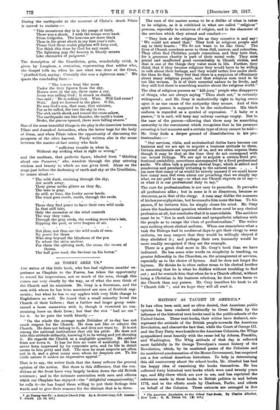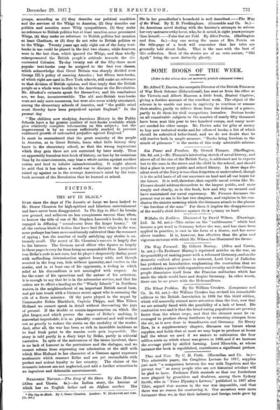HISTORY AS TAUGHT IN AMERICA.*
IT has often been said, and as often denied, that American public opinion has been rendered unfriendly to Great Britain by the influence of the historical text-books used in the public schools of the United States. These test-books, their ethics have declared, mis- represent the attitude of the British people towards- the American Revolution, and obscure the fact that, while the Court of George III, and the Tory Party were hoetileto the American Colonists, the Whigs sympathized most heartily with the cause led by Adams, Franklin, and Washington. The Whig attitude of that day is reflected most faithfully in Si- George Trevelyan's recent history of the Revolution, which, by its unstinted praise of the Colonists and its unrelieved condemnation of the Home Government, has surprised not a few critical American historians. To help in determining this old controversy about the school-books, Mr. Altaehul has had the happy idea of examining tire books themselves, He has collected forty historical text-books which were used twenty years ago, and fifty-three which are now in else, and has reprinted the references made in these books to British politics in and before 1778, and to the efforts made by Chatham, Burke, and others on behalf of the Colonies. These extracts are arranged in five • TM denims enotatem in OW Sehml Togl-Booke. Dr Charles Altseliol. New Yoe, Ct. H. Doran Co. Ill set.)
groups, according as (I) they describe our political -condition and the services of the Whige to America, (2) they describe our politics and mention some Whig sympathizers, (3) they make no reference to British politics but at leaat mention some prominent Whigs, (1) they make no reference to British politics but mention at least Chatham, or (5) they do not refer to British politics or to the Whigs. Twenty years ago only eight out of the forty text- books in use could be placed in the first two classes, while fourteen were in the last claw, which ignored the Whigs, and thus wholly misrepresented the British people's attitude towards the dis- contented Colonies. To-day twenty out of the fifty-three most popular textbooks may be assigned to the first two classes, which acknowledge that Great Britain was sharply divided over George Ill.'s policy of coercing America ; but fifteen textbooke, of which eight are used in Now York schools, still make no reference to that division of British opinion, and thus imply that the British people as a whole were hostile to the Americans at the Revolution. Mr. Altschul's extracta speak for themselves, and his conclusions are, we fear, incontrovertible. The old anti-British text-books were not only more numerous, but were also more widely circulated, among the elementary schools of America, and "the public mind must thereby have been prejudiced against England." In the present day "The children now studying American History in the Publio Schools have a far greater number of text-books available which give relatively complete information on this subject; but the Improvement is by no means sufficiently marked to prevent continued growth of unfounded prejudice against England."
It must be remembered that the great majority of the people in America, as in Great Britain, learn what little history they know in the elementary wheel, so that the wrong impressions which they gain there are not corrected by later study. Thus an apparently harmless text-book of history, no less by its omissions than by its misstatemente, may Mae a whole nation against another nation and load to infinite misunderstanding. It might almost be said that it has taken a world-war to dissipate the prejudice raised up against us in the average American's mind by the text- book account of the Revolution that he learned at school.



























 Previous page
Previous page